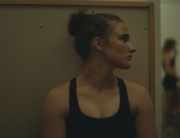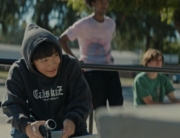At the age of 10, writer/director Lena Dunham fell in love with Karen Cushman’s 1994 middle-grade historical novel, Catherine, Called Birdy, for its feelings “of extreme coziness” (as she writes in a press statement) and “brazen defiance.” Thanks to the talents of production designers Kave Quinn and Andrea Matheson, that book’s cozy medieval world (minus its smelly horse droppings and chicken dung) has been re-created in this stylized–and deliberately anachronistic–adaptation that recalls Brian Helgeland’s 2001 crowd pleaser A Knight’s Tale. (Dunham even hired that previous film’s composer, Carter Burwell, to create a score that mixes a capella vocals by the ensemble Roomful of Teeth with fresh covers of contemporary pop classics like Mazzy Star’s “Fade Into You” and Alicia Keyes’s “Girl on Fire.”)
Bringing the spunky defiance is perky Bella Ramsey as Catherine (Birdy to her family and friends), the high-spirited, 14-year-old only daughter of Lord Rollo (a louche Andrew Scott) of Stonebridge Manor and a perpetually pregnant Lady Aislinn (Billie Piper). The year is 1290, and as the film opens, Birdy is enthusiastically engaged in a mud fight with Perkin the goat boy (Michael Woolfitt) and other villagers, much to the amusement of her indulgent nursemaid Morwenna (Lesley Sharp): “To think I washed you a fortnight ago. What a waste.”
But Birdy’s carefree days of shirking her spinning chores, critiquing her father’s inept swordplay, teasing her older brother, and causing mischief in the village may be soon coming to an end. The spendthrift Rollo needs money, and his manager advises he marry off his daughter for a fat dowry.
What follows are Birdy’s attempts to ward off suitor after suitor, from stuffing her menstrual rags down the privy (hiding proof of her marriageability) to dressing up as a bog witch and committing other bizarre, off-putting behaviors. Her hope of resolving her situation with the help of her beloved Uncle George (Joe Alwyn) is dashed when he weds an older wealthy widow, Ethelfritha (Sophie Okonedo). Meanwhile, she sees her best friend, Aelis (Isis Hainsworth), married off to a nine-year-old duke. Birdy finally meets her match in the wily and repulsive Shaggy Beard (Paul Kaye), who enjoys the chase and won’t be deterred by his bride-to-be’s shenanigans.
Dunham’s screenplay incorporates her feminist sensibility and modern bodily obsessions, which sometimes makes for clunky and inconsistent moments. In an age when women are treated basically as chattel, Lady Aislinn tells her husband that she wants to be his partner, and Birdy’s initiation into womanhood with the arrival of her first period (as explained to her by Morwenna and definitely not found in Cushman’s novel) is undercut by her naïve questions about virginity. This viewer found it hard to believe that even in the sanitized Medieval Times world depicted here Birdy would be so ignorant about the basic facts of life, especially in light of her mother’s constant pregnancies. Yet her teenage hormones also drive her to fondle a statue of Jesus while ogling the hot monks at her brother Edward’s abbey.
It’s understandable that as a screenwriter Dunham would make revisions, including fleshing out the character of Lord Rollo, who is depicted in the novel as a distant and physically abusive tyrant, but she does the source material a grave disservice by replacing the original ending with a Hollywood finale that robs Birdy of the little agency she has and undermines Dunham’s own feminism.
Despite these flaws, there are some pleasures to be found here, including Ramsey’s ebullient performance, Sharp’s no-nonsense but affectionate Morwenna, and Julian Day’s lovely period costumes tinged with a modern edge. Be sure to stay for the delightful animated closing credits that bring an illuminated manuscript to life.

















Leave A Comment